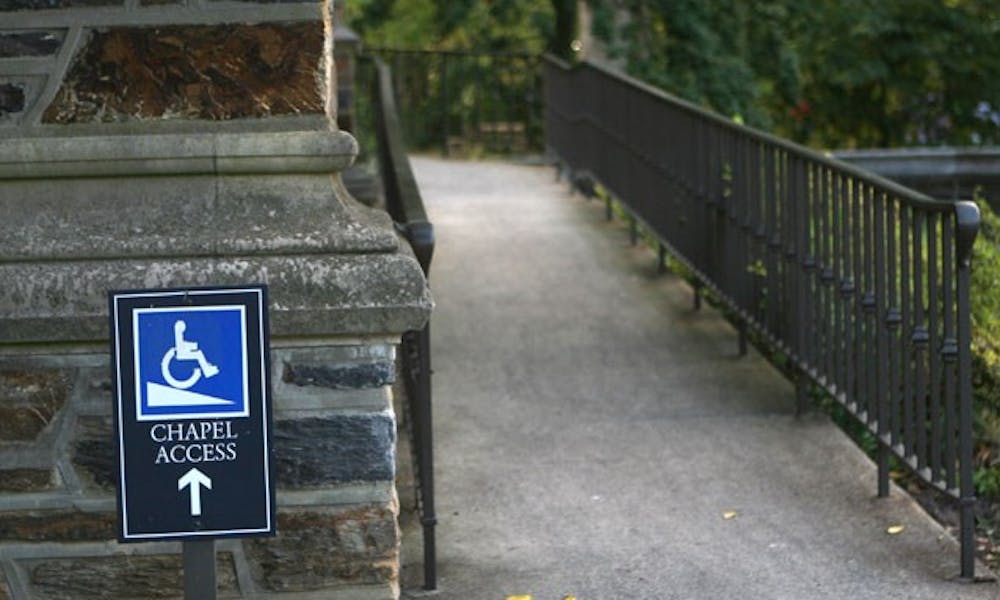The opening of a Disability Cultural Center was a project three years in the making for Duke Disability Alliance. Now, it will have to wait at least until the fall.
The idea for the center was born in Fall 2017, according to junior and DDA Co-President Maddie Fowler. The group has been researching the idea, writing proposals and meeting with administration since then. Their efforts would have resulted in the opening of a temporary space in the Bryan Center last week, a milestone that is now on hold while campus is closed during the coronavirus pandemic.
The goal of the center “would [be to] allow this community to feel welcome on campus, to find each other and build social support networks, and to explore and express disability culture,” said Marion Quirici, lecturing fellow of the Thompson Writing Program and DDA’s faculty advisor.
Fowler also expressed disappointment that the seniors who have been working on the project will no longer be able to see it come to fruition.
Although Duke has provided academic accommodations for disabled students, Fowler argued that disability as an identity has been overlooked.
“At Duke there is a lot of this idea that disability is something you need to have an accommodation for and that’s all,” she said. “Disability is so much more than that—different and unique challenges that we need support for.”
Duke offers centers and resources for other minority groups, such as the Center for Sexual and Gender Diversity and the Mary Lou Williams Center for Black Culture. Quirici said it would be good for Duke to have a center “recognizing disability and neurodiversity.”
Quirici pointed out that individuals with disabilities make up 10% of the global population, which makes them the largest minority group in the world.
By researching centers at other universities for students with disabilities, the DDA designed a space that would best suit the disabled community’s needs at Duke. The plans include a sensory-friendly, accessible area for students to collaborate, study and relax, as well as a space to hold seminars or workshops. They hope to provide a full-time staff to coordinate these events. Artwork by Duke students and local artists exploring themes of disability will adorn walls friendly to colorblind students.
In creating a Disability Cultural Center, Duke would join a list of other universities who have already recognized this need, including: Stanford University, University of Washington, University of Missouri, Syracuse University, University of Arizona and University of Illinois at Chicago, among others.
The center scheduled to open this week, however, would have been a temporary space. Fowler said the group identified the space at a meeting before spring break. They planned to create a library of work in disability studies to be housed there, alongside hosting meetings and events.
The library would give students and faculty access to works from a field that doesn’t often receive visibility or recognition. This increased visibility would also fight stigma on campus and promote disability pride.
“We also were planning to use the temporary space as an opportunity to figure out how to put into practice all of the accessibility features we had designed for the Cultural Center, and to figure out how to make our Cultural Center the most welcoming, accessible and supportive space possible,” Fowler said.
Despite the community being separated by the COVID-19 crisis, the DDA still celebrated Pride Week online April 6-11. This includes a change of plans for Accessibility Matters Day, which began in 2011, according to Cuquis Robledo, lab manager for the Health Humanities Lab.
Usually, students would celebrate by pledging to take only accessible routes that day, which Robledo said was meant to “showcase campus' inaccessibility.”
Because of the pandemic, the DDA chose to take a different direction this year.
“We want to look at it on a broader scale and how accessibility matters in terms of access to healthcare, to doctor care, to medications,” Robledo said.
She explained that many of her friends in the disability community feel afraid of being left behind if they contract the virus, such as receiving lower-quality care compared to someone who is more likely to recover. Robledo said accessibility is important in this case because everyone, people with disabilities included, should have access to health care during the pandemic.
As for the creation of the Disability Cultural Center, Fowler said DDA now has to work with administration to decide whether they will open a temporary space when possible, or whether they will wait until a permanent space is available.
“We ideally hope to have a cultural center open, either temporary or permanent, within the next two semesters,” Fowler said.
Get The Chronicle straight to your inbox
Sign up for our weekly newsletter. Cancel at any time.

